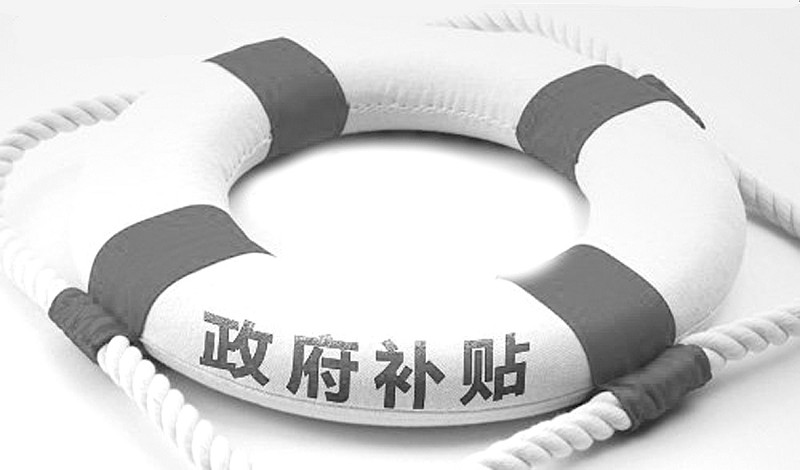One of the main concerns for China in recent years has been excess capacity, especially in heavy industries like steel.
近些年,產(chǎn)能過剩,尤其是鋼鐵行業(yè)引起了人們的關(guān)注。
The central government has tried to address this issue, but Hu Yanping, an analyst at Custeel.com, says local governments’ continued support of steel producers is thwarting this attempt.
中央政府一直在解決問題,但中國聯(lián)合鋼鐵網(wǎng)分析師胡艷平表示,由于當(dāng)?shù)卣畬︿撹F的不斷支持,使得這一問題很難得到解決。
For instance, Lingyuan Iron & Steel Co. Ltd. is a state-owned enterprise in Chaoyang, Liaoning province.
例如遼寧省朝陽市凌源鋼鐵股份有限公司,該公司為國有企業(yè)。
It has been producing and distributing steel for construction since 1966.
自1966年以來,該公司一直生產(chǎn)鋼鐵。
According to the company, it has been the top tax contributor for the local government.
據(jù)公司所說,凌源鋼鐵一直是當(dāng)?shù)卣闹饕愂諄碓础?/p>
However, with the slowdown of the property market, its profitability dwindled, and it became a beneficiary of local government subsidies, which since 2012 have covered hundreds of millions of yuan in losses.
然而,隨著房地產(chǎn)市場投資放緩,效益低迷,凌源也因此獲得了政府補(bǔ)貼,自2012年起,補(bǔ)貼經(jīng)濟(jì)損失數(shù)億元。
According to a person familiar with the industry, there are more than 100 state-backed steel companies like Lingyuan in China.
據(jù)業(yè)內(nèi)人士指出,像凌源這樣的國有鋼鐵公司在中國有100多家。

Indeed, local governments elsewhere in the country continue to give steel producers hundreds of millions of yuan in the hopes that steel makers'contributions to public coffers will rebound.
在中國其它地區(qū),當(dāng)?shù)卣^續(xù)向鋼鐵公司提供數(shù)億元財(cái)政補(bǔ)貼,希望鋼鐵公司能為社會帶來更大效益。
Additionally, local governments extend aid in order to avoid mass lay-off of workers for fear of social unrest.
此外,為了避免工人大面積下崗,引發(fā)社會動(dòng)亂,當(dāng)?shù)卣當(dāng)U大救助范圍。
But those hopes might be in vain.
但這些希望或許均會落空。
Hu says, although steelmakers account for a significant share of local tax revenues, they are falling behind on their payments as the economy slows.
但胡艷平表示,盡管鋼鐵公司是當(dāng)?shù)囟愂盏闹饕獊碓矗S著中國經(jīng)濟(jì)放緩,他們更是入不敷出。
Indeed, it is hard to see how steel makers can cough up the cash.
鋼鐵公司步履維艱。
The industry suffered a loss of 72 billion yuan in the first 10 months of this year and the sector made 300 million more tons of steel than it needed this year.
今年前10個(gè)月,鋼鐵產(chǎn)業(yè)損失720億元,產(chǎn)能比去年增加3億噸。
And industry associations think demand for steel will fall by 3 percent next year.
某鋼鐵產(chǎn)業(yè)協(xié)會表示,明年的鋼鐵需求將減少3%。
Not only that, continued support for such steel producers means market forces won't be able to play the decisive role of ensuring that resources are efficiently distributed, says a person familiar with the matter.
消息人士指出,由于政府不斷扶持,市場在資源配置中的決定性作用無法得到充分發(fā)揮。
Caixin has argued that as history has shown, cutting overcapacity won't be painless.
財(cái)新認(rèn)為以史為鑒,去產(chǎn)能并不會一帆風(fēng)順。
But in the 1990s the government has shown plenty of boldness in restructuring state-owned enterprises, leading China into an era of double-digit growth.
但在上世紀(jì)90年代,政府改革國有企業(yè)勢頭迅猛,經(jīng)濟(jì)呈兩位數(shù)趨勢增長。
Now, those nerves of steel will be needed more than ever.
如今,鋼鐵產(chǎn)業(yè)改革迫在眉睫。
譯文屬可可英語原創(chuàng),未經(jīng)允許,不得轉(zhuǎn)載。











